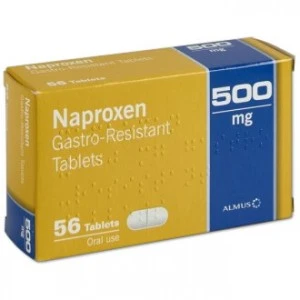Is naproxen 500 mg strong painkiller
Naproxen is from a class of medicines called non-steroidal anti-inflammatory drugs, or NSAIDs.
It is known for its effective pain relief and ability to reduce swelling in a variety of musculoskeletal conditions, particularly in arthritis. NSAIDs are a group of medicines which bring pain relief, so it is useful to compare them against other NSAIDs (e.g. ibuprofen, diclofenac, celecoxib) to understand their potency better.
At a glance:
- Naproxen may provide better long-term pain relief compared to ibuprofen, but ibuprofen works faster
- All NSAIDs are similar in terms of the 'strength’ of pain relief
- The decision between one NSAID and another is based on the side effect profile
What is Naproxen?
To get a better idea of naproxen’s potency, we need to briefly look at how it works. Like many NSAIDs, naproxen targets cyclooxygenase (COX) enzymes. It does so because COX enzymes produce chemicals called prostaglandins, which result in pain and inflammation.
By blocking these enzymes, naproxen reduces prostaglandin levels, thereby reducing pain and inflammation.
Due to its pain-relieving effect, it can be used to treat various conditions, including headaches, joint and muscle pains, and even menstrual cramps.
Naproxen 250mg & 500mg Tablets
- Used to provide pain relief
- Nonsteroidal anti-inflammatory
- For easing moderate to severe pain
Is Naproxen ‘strong’ compared to other painkillers?
Naproxen is available in two different strengths: 250mg and 500mg. At 500mg, it should be taken at most twice a day.
Naproxen 500mg VS Ibuprofen
When naproxen is taken, peak levels of the drug are reached in the body after 2-4 hours. Ibuprofen, however, only takes 1-2 hours. This means that ibuprofen works faster, i.e., it has a faster onset of action. Therefore, for acute pain relief, ibuprofen is a more effective option. However, ibuprofen is also cleared from the body a lot quicker.
The half-life of a drug is the time it takes for the drug concentration in the body to halve – it is used to give a measure of how fast a drug is cleared from the body. The half-life of ibuprofen is approximately 2 hours, whereas that of naproxen is considerably longer, ranging from 12 to 15 hours.
This means that naproxen provides ‘longer-lasting’ pain relief, which is why naproxen 500mg is taken twice a day, whereas ibuprofen 400mg is taken up to three times daily. Note that two different drugs may have different strengths, but this does not mean the higher strength of one drug is more potent. E.g. 600mg of Drug X may be less potent than 25mg of Drug Y.
From this, naproxen may be better suited towards ‘long-term’ chronic pain, such as muscle aches, whereas ibuprofen may be better for acute, short-term pain like headaches.
Which is the strongest NSAID?
There is no definitive ‘strongest’ NSAID, as they all work similarly, i.e., by inhibiting COX enzymes. They differ in their selectivity for COX enzymes (which are distinct, e.g., COX-1, COX-2), resulting in variability in individual responses and an increased likelihood of side effects.
Naproxen 500mg compared to other NSAIDs
With the above said, the reason behind one NSAID being preferred over another is often due to its side effect profile. All NSAIDs can cause gastrointestinal side effects (stomach upsets), hence why they are advised to be taken with food to reduce this risk.
Likelihood of gastrointestinal side effects:
- Medium risk: naproxen, diclofenac
- Low risk: ibuprofen
Some NSAIDs are more selective towards COX-2 enzymes (e.g. Celecoxib), which have a lower risk of serious stomach and upper belly side effects, e.g. stomach pain, nausea and vomiting.
NSAIDs can lead to a slightly increased risk of cardiovascular events. Naproxen (1g daily) and up to 1.2g of ibuprofen are considered low-risk. However, the maximum dose of ibuprofen is 2.4g daily, which would increase this risk.
Can anyone take Naproxen?
Naproxen is not suitable for everyone. As an NSAID, it interacts with certain medicines. This includes some medicines which can be bought over the counter in a pharmacy (e.g. pseudoephedrine), so it is worth mentioning to your pharmacist during purchase.
It may not be suitable for individuals with specific conditions. These include asthma, high blood pressure (hypertension) and kidney/liver problems. Some individuals are allergic to NSAIDs, so if any of the above apply, it is important to speak to your doctor or pharmacist first.
Conclusion
You may find more benefits in a particular NSAID compared to someone else. In fact, roughly 60% of individuals will respond to any NSAID.
Even though they work in a similar way, your body may respond better to a particular one. Therefore, if you have found naproxen to be ineffective, speak to your doctor. A straightforward switch may be all that is required for some much-needed pain relief!
Sources
Authored By

Dr Giuseppe Aragona
DoctorPublished on: 31/01/2023
Reviewed By

Mohamed Imran Lakhi
MPharm - Lead PharmacistReviewed on: 05/06/2025
© 2013 - 2025 Al Muhsineen Limited. All Rights Reserved. Registered Pharmacy: 34 Halliwell Road, Bolton BL1 8RL. Registered Office: 254 First Floor, Shearbrow, Blackburn, England, BB1 8DS






